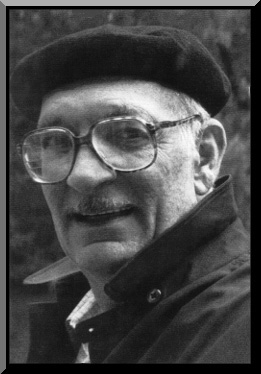George Crumb (1929 - )
 An
American composer, combined study at American universities with study in
Berlin. His compositions reflect a tendency to relate traditional
formalities with very extreme demands on technical resources. Exceptional
combinations
of electronic instruments and conventional instruments, as well
as electrically amplified instruments, result
in extraordinary tonal effects. This interest in unusual sound qualities
demands that his vocal forces sing microtonal intervals,
shriek, hiss, whisper, and produce other non-traditional vocal sounds.
Works such as "Night of the Four Moons," for alto flute, banjo,
electric cello, and percussion (1969); "Songs, Drones and Refrains
of Death," for baritone, electric guitar, electric double bass, electric
piano, and percussion (1968); "Ancient
Voices of Children" a song cycle for mezzo-soprano, boy soprano,
oboe, mandolin, harp, electric piano, and percussion; and "Lux aeterna
for Five Masked Players," for soprano, bass flute, sitar, and two percussion
players (1971) are representative of Crumb's interest in such sound effects.
In addition to writing for groups instruments with vocalists, he has written
extensively for piano. "Zeitgeist" (1988) is for two amplified
pianos. An "Idyl for the Misbegotten," for amplified flute
and three percussionists (1986), combines electronically altered and traditional
sounds. Crumb is on the faculty of the University of Pennsylvania.
An
American composer, combined study at American universities with study in
Berlin. His compositions reflect a tendency to relate traditional
formalities with very extreme demands on technical resources. Exceptional
combinations
of electronic instruments and conventional instruments, as well
as electrically amplified instruments, result
in extraordinary tonal effects. This interest in unusual sound qualities
demands that his vocal forces sing microtonal intervals,
shriek, hiss, whisper, and produce other non-traditional vocal sounds.
Works such as "Night of the Four Moons," for alto flute, banjo,
electric cello, and percussion (1969); "Songs, Drones and Refrains
of Death," for baritone, electric guitar, electric double bass, electric
piano, and percussion (1968); "Ancient
Voices of Children" a song cycle for mezzo-soprano, boy soprano,
oboe, mandolin, harp, electric piano, and percussion; and "Lux aeterna
for Five Masked Players," for soprano, bass flute, sitar, and two percussion
players (1971) are representative of Crumb's interest in such sound effects.
In addition to writing for groups instruments with vocalists, he has written
extensively for piano. "Zeitgeist" (1988) is for two amplified
pianos. An "Idyl for the Misbegotten," for amplified flute
and three percussionists (1986), combines electronically altered and traditional
sounds. Crumb is on the faculty of the University of Pennsylvania.
 An
American composer, combined study at American universities with study in
Berlin. His compositions reflect a tendency to relate traditional
formalities with very extreme demands on technical resources. Exceptional
combinations
of electronic instruments and conventional instruments, as well
as electrically amplified instruments, result
in extraordinary tonal effects. This interest in unusual sound qualities
demands that his vocal forces sing microtonal intervals,
shriek, hiss, whisper, and produce other non-traditional vocal sounds.
Works such as "Night of the Four Moons," for alto flute, banjo,
electric cello, and percussion (1969); "Songs, Drones and Refrains
of Death," for baritone, electric guitar, electric double bass, electric
piano, and percussion (1968); "Ancient
Voices of Children" a song cycle for mezzo-soprano, boy soprano,
oboe, mandolin, harp, electric piano, and percussion; and "Lux aeterna
for Five Masked Players," for soprano, bass flute, sitar, and two percussion
players (1971) are representative of Crumb's interest in such sound effects.
In addition to writing for groups instruments with vocalists, he has written
extensively for piano. "Zeitgeist" (1988) is for two amplified
pianos. An "Idyl for the Misbegotten," for amplified flute
and three percussionists (1986), combines electronically altered and traditional
sounds. Crumb is on the faculty of the University of Pennsylvania.
An
American composer, combined study at American universities with study in
Berlin. His compositions reflect a tendency to relate traditional
formalities with very extreme demands on technical resources. Exceptional
combinations
of electronic instruments and conventional instruments, as well
as electrically amplified instruments, result
in extraordinary tonal effects. This interest in unusual sound qualities
demands that his vocal forces sing microtonal intervals,
shriek, hiss, whisper, and produce other non-traditional vocal sounds.
Works such as "Night of the Four Moons," for alto flute, banjo,
electric cello, and percussion (1969); "Songs, Drones and Refrains
of Death," for baritone, electric guitar, electric double bass, electric
piano, and percussion (1968); "Ancient
Voices of Children" a song cycle for mezzo-soprano, boy soprano,
oboe, mandolin, harp, electric piano, and percussion; and "Lux aeterna
for Five Masked Players," for soprano, bass flute, sitar, and two percussion
players (1971) are representative of Crumb's interest in such sound effects.
In addition to writing for groups instruments with vocalists, he has written
extensively for piano. "Zeitgeist" (1988) is for two amplified
pianos. An "Idyl for the Misbegotten," for amplified flute
and three percussionists (1986), combines electronically altered and traditional
sounds. Crumb is on the faculty of the University of Pennsylvania.